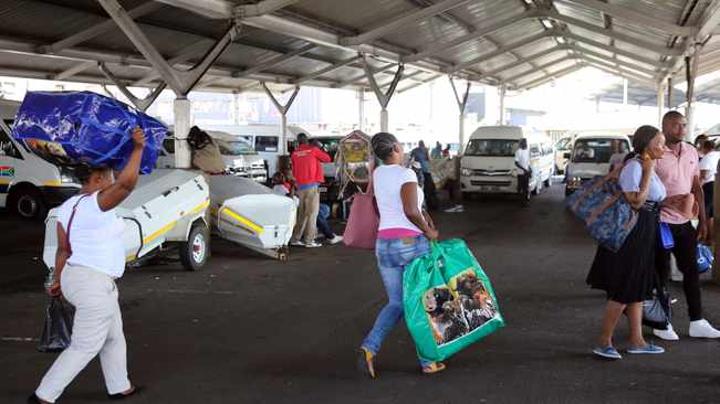
Africa-Press – South-Africa. With each day that passes during the Covid-19 travel restrictions, the wheels are slowly coming off the long-distance transport industry.
The coronavirus pandemic is wreaking havoc and the industry has had to wrestle with previously unseen hardships, from fleet owners losing buses whose monthly repayments they can no longer service, to having to contend with dwindling commuter numbers.
Normally an Easter holiday weekend such as the current one would see the Lesotho-bound taxis at the Chris Hani Baragwanath Hospital rank choc-a-bloc with the Mountain Kingdom’s nationals catching a ride home.
But on Thursday, just one minibus, that had been loading since 8am, had still not been filled to three-quarters of its capacity nearly four hours later.
“As you can see,’” says chairman of the Kopanang Basotho Taxi Association at Bara, Jacob Madonsela, gesturing helplessly, “there are no people. Before Covid, there would barely be standing room around here.”
“It is just hunger,” he says.
He adds: “December was better.”
The fare from this rank to the four border posts into Lesotho – Maseru, Wepener, Ficksburg and Butha-Buthe – is R280. For the ordinary Mosotho, the Easter travel home has attracted another expense, the R300 for the Covid-19 test.
Madonsela laments the myriad reasons his association is seeing a decreasing number of passengers, chief among which is “social media, which fuels a lot of misinformation about the opening and closing of borders in Lesotho”.
As a result of this, says Madonsela, people who would ordinarily have gone home for Good Friday, chose to stay at work in South Africa.
Inside the lone taxi that’s battling to draw more passengers, one of them, a matronly woman, says she’s going home to Hlotse in Leribe. She would not give her name “not in the newspapers”, but she says she has to go home “now and in Christmas” just to make sure all is well. “It is my house,” she says, “I just have to make sure everything is still fine there.”
Echoed by fellow commuters, she tells the story of how those who cannot afford the R300 charge for the Covid-19 permit run the gauntlet of the immigration authorities at the borders. It is a harrowing tale.
The Fleet Africa Cross-border rank in Newtown, downtown Joburg, is a community on its own. It has food stalls, hotels and teems with traders of all sorts of wares a long-distance traveller could ever want for the road.
All sorts of purchases are being loaded on the buses for destinations across the border into – mostly – Zimbabwe.
Before ‘the new normal’, the rank saw fleets from about 800 bus companies. These days there are 34 bus operators using the bustling facility. Many of the owners have had their vehicles repossessed by banks for failure to meet their monthly repayments, says the grapevine here.
Those in charge of Fleet Africa brag that it is the only one recognised by the Department of Transport and the City of Johannesburg (CoJ).
Edson Munyai runs Graca Luxury Coaches, that services the Zimbabwean towns of Harare, Mutare and Gokwe. “Buses were full,” Munyai says when asked how things were before the virus hit. “It’s bad now. Nothing is good.”
From the once-hectic schedule of seven buses, he is now lucky to see one bus leave for Zimbabwe a week. His fleet comprises 65- and 70-seater luxury buses, “but we can only take 15 or even 10 people on a trip.”
“We pay more money to transport people. Insurance is up. At the border they open every item to check it.”
The items taken on these trips range from household furniture, building materials to car parts. Zimbabwean traders who buy their supplies in Joburg also add variety to the stock of goods going on the buses, mostly blankets and trinkets.
Like their competition, Munenzwa Luxury Coaches charges R600 a trip from here to the other side of Beit Bridge. Manager Shepherd Mudadi says their fleet also plies the Cape Town route.
“We are seeing less and less passengers,” he says ruefully. He tallies up their expenses, from diesel to toll fees (R1 100 one-way in South Africa) and R1 800 for a return trip on Zimbabwean roads.
“Going home is not a problem,” Mudadi shares the experiences of his fares. “It is coming back into South Africa that is a problem. People do not have permits to enter the country.”
As a result, many of the buses ferrying loads of people to Zimbabwe are doing repatriation only and, according to Anna Maphoto and Susan Ndobe of Mzansi Express, “the buses return empty to South Africa”.
Both Ndobe and Maphoto decry the same pain of many affected employees – reduced salaries, retrenchments and tenants failing to meet their monthly rentals.
There was a time when Mzansi Express used to deploy two buses on one route to Bulawayo and Harare. “Not any more,” says Maphoto, “we have had some buses repossessed.”
“We were busy every day of the week,” she says. Now, it seems, they are happy to see a trickle of passengers a day.
Andries Shiluvani is chairman of the Traders Association: “There are 34 formal traders,” he says.
His own kiosk is closed: “There are no customers to sell to.”
Luckily for Shiluvani and other traders, the Johannesburg Property Company (JPC) has put a moratorium on rentals. “It was R1 100,” says the chairman. “At least we can breathe easier now because the JPC has stopped rental payments, for now.”
[email protected]
The Sunday Independent





